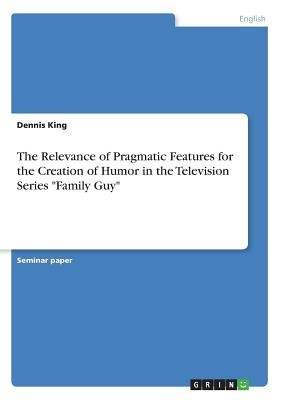
- We will send in 10–14 business days.
- Author: Dennis King
- Publisher: GRIN Verlag
- Year: 2018
- Pages: 28
- ISBN-10: 3668647534
- ISBN-13: 9783668647534
- Format: 14.8 x 21 x 0.2 cm, softcover
- Language: English
- SAVE -10% with code: EXTRA
The Relevance of Pragmatic Features for the Creation of Humor in the Television Series Family Guy (e-book) (used book) | bookbook.eu
Reviews
Description
Seminar paper from the year 2017 in the subject English Language and Literature Studies - Linguistics, grade: 1,0, University of Flensburg, course: Selected Areas of English Linguistics for TEFL Teachers, language: English, abstract: In this paper, I will analyze the animated sitcom Family Guy in terms of three linguistic features and how they relate to creating humor. The sitcom is an example of (scripted) authentic English language. The paper is divided into five sections. After this introduction, I will provide relevant theoretical background knowledge. I will start by reminding the reader of the concept of pragmatics and then introduce three pragmatic theories. First, I will present Speech Act Theory with its differentiation of the locutionary act, the illocutionary act and perlocutionary act as well as the differentiation between direct and indirect speech acts. Second, I will depict the Cooperative Principle with its four maxims (quantity, quality, relation and manner), the four types of non-observance of these maxims (flouting, violating, opting out and infringing) and the notion of implicature. Third, I will introduce the concept of politeness including positive and negative face and the idea of face-threatening acts that need to be compensated by politeness strategies. In section three, I will present Family Guy and its characters and state why using a sitcom is beneficial for my analysis. In section four, I will present and analyze eleven excerpts from various episodes in terms of the creation of humor based on pragmatic features. I will end this paper with a conclusion, in which I will present thirteen 'humor formulas' that I was able to deduce from the analysis.
EXTRA 10 % discount with code: EXTRA
The promotion ends in 20d.09:16:07
The discount code is valid when purchasing from 10 €. Discounts do not stack.
- Author: Dennis King
- Publisher: GRIN Verlag
- Year: 2018
- Pages: 28
- ISBN-10: 3668647534
- ISBN-13: 9783668647534
- Format: 14.8 x 21 x 0.2 cm, softcover
- Language: English English
Seminar paper from the year 2017 in the subject English Language and Literature Studies - Linguistics, grade: 1,0, University of Flensburg, course: Selected Areas of English Linguistics for TEFL Teachers, language: English, abstract: In this paper, I will analyze the animated sitcom Family Guy in terms of three linguistic features and how they relate to creating humor. The sitcom is an example of (scripted) authentic English language. The paper is divided into five sections. After this introduction, I will provide relevant theoretical background knowledge. I will start by reminding the reader of the concept of pragmatics and then introduce three pragmatic theories. First, I will present Speech Act Theory with its differentiation of the locutionary act, the illocutionary act and perlocutionary act as well as the differentiation between direct and indirect speech acts. Second, I will depict the Cooperative Principle with its four maxims (quantity, quality, relation and manner), the four types of non-observance of these maxims (flouting, violating, opting out and infringing) and the notion of implicature. Third, I will introduce the concept of politeness including positive and negative face and the idea of face-threatening acts that need to be compensated by politeness strategies. In section three, I will present Family Guy and its characters and state why using a sitcom is beneficial for my analysis. In section four, I will present and analyze eleven excerpts from various episodes in terms of the creation of humor based on pragmatic features. I will end this paper with a conclusion, in which I will present thirteen 'humor formulas' that I was able to deduce from the analysis.


Reviews